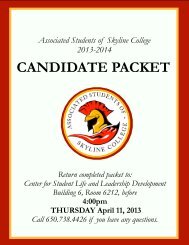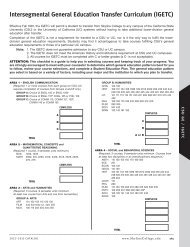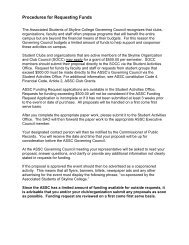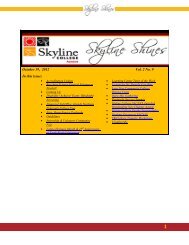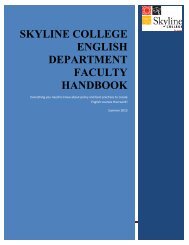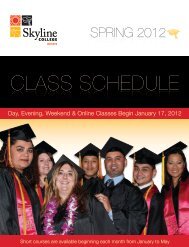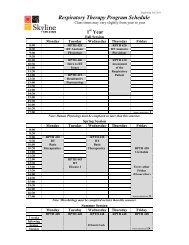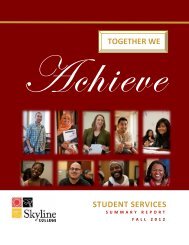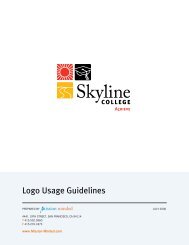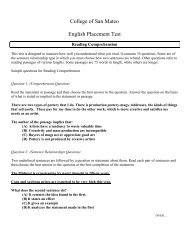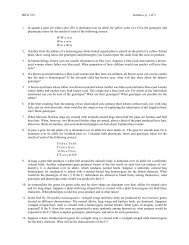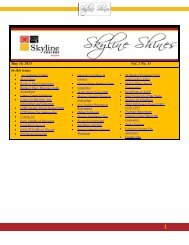Skyline College Catalog 2011-2012 Program & course descriptions ...
Skyline College Catalog 2011-2012 Program & course descriptions ...
Skyline College Catalog 2011-2012 Program & course descriptions ...
Create successful ePaper yourself
Turn your PDF publications into a flip-book with our unique Google optimized e-Paper software.
BIOL 101 OUR BIOLOGICAL WORLD (4)Minimum of 48 lecture hours and 48 lab hours/semester.Recommended: Eligibility for ENGL 836.Study of biology as it relates to humans and theirenvironment, with special emphasis on ecological interrelationships,evolution and genetics, and topics of currentimportance. Recommended for non-science majors tofulfill laboratory science transfer requirement. Transfercredit: UC; CSU (B2, B3).BIOL 110 PRINCIPLES OF BIOLOGY (4)Minimum of 48 lecture hours and 48 lab hours/semester.Recommended: Eligibility for ENGL 836.Using natural selection and physiological survival as aunifying theme, this <strong>course</strong> deals with the basic problemscommon to all living systems, and compares the functionalsolution that various organisms have evolved,illuminating the unity in diversity that characterizes life onearth. Recommended for non-science majors to fulfilllaboratory science transfer requirement. Transfer credit:UC; CSU (B2, B3).BIOL 111 NATURAL HISTORY OF CALIFORNIA (4)Minimum of 48 lecture hours and 48 lab hours/semesterwith frequent field trips. Recommended: Eligibility forENGL 836.Students will investigate the functioning of eco -systems, adaptations of organisms to their environmentand natural history of selected organisms. Students willbecome familiar with natural ecosystems of California,with a primary focus on the San Francisco Bay Area.Laboratory and field investigations will be conductedusing the scientific method; critical thinking skills will beemphasized. Recommended for non-science majors tofulfill laboratory science transfer requirements. Transfercredit: UC; CSU (B2, B3).BIOL 130 HUMAN BIOLOGY (3)Minimum of 48 lecture hours/semester. Recommended:Eligibility for ENGL 836.A <strong>course</strong> designed to provide students with an appreciationof the structure, function, and development of theirown bodies. Topics include an introduction toscience and to scientific methods of investigation, andsome elementary chemistry (no previous backgroundnecessary) as a basis for understanding human functionssuch as digestion, circulation, reproduction and other systems.Some diseases and other causes of body malfunctionare discussed. Transfer credit: UC; CSU (B2).BIOL 140 ANIMALS, PEOPLE AND ENVIRONMENT (3)Minimum of 48 lecture hours/semester. Recommended:Eligibility for ENGL 836.This <strong>course</strong> will familiarize the student with the methodsand importance of behavioral investigation in animals.Emphasis on past and current human-animal relationships,the impact on animal populations and increasing need forwildlife protection. Transfer credit: UC; CSU (B2).BIOLOGYBIOL 145 PLANTS, PEOPLE AND ENVIRONMENT (3)Minimum of 48 lecture hours/semester. Recommended:Eligibility for ENGL 836.A survey of plants emphasizing those aspects of plantbiology that have affected the lives of people. Topicsinclude: the success and failure of modern agriculture; theimpact of humans on the environment; and the importanceof plants in solving critical problems of hunger andconservation of energy. Attention is given to modes ofinquiry or ways in which scientists carry out their investigations.Transfer credit: UC; CSU (B2).BIOL 150 INTRODUCTION TO MARINE BIOLOGY (3)Minimum of 48 lecture hours/semester. Recommended:Eligibility for ENGL 836.A non-technical introduction to the scientific methodused in studies of marine biology. Major emphasis is givento the natural history of marine animals and plants andtheir relationship with the oceanic environment. Transfercredit: UC; CSU (B2).BIOL 170 PRINCIPLES OF APPLIED BIOSCIENCE (3)Minimum of 48 lecture hours/semester. Recommended:Eligibility for ENGL 836 and READ 836, or ENGL 846, orequivalent.A survey of the principles that govern the living world,from molecules to cells and tissues, to organs and wholeorganisms, to populations and ecosystems, to the entirebiosphere. Special emphasis is placed upon experi mentalapproaches, current issues, and practical application ofthe scientific method and biological principles to issuesaffecting public health, agriculture, and socio economicchange. Current news and developments in relevant areasof biological sciences and biotechnology will be reviewedand discussed. Transfer credit: UC; CSU (B2).BIOL 171 LABORATORY PRINCIPLES OF APPLIEDBIOSCIENCE (1)Minimum of 48 lab hours plus 16 hours by arrangement/semester. Prerequisite: Completion of or concurrentenrollment in BIOL 170. Recommended: Eligibility forENGL 836 and READ 836, or ENGL 846, or equivalent.Laboratory <strong>course</strong> introducing students to practicalmethods in preparing materials, reagents and media forconducting biological investigations and products ofgenetic engineering. Students will learn to measure andprepare solutions of various concentrations and pH, howto use basic chemistry and biological instrumentationsuch as digital scales, pipettes and micropipettes,centrifuges, and vertical and horizontal electrophoresisapparatuses. Students will plan and conduct biologicalexperiments using the scientific method and employingmodern laboratory methods and instrumentation. Datawill be analyzed using spreadsheet software for tabulationand graphing. Teamwork, responsible lab technique, andproper and thorough notebook keeping will be emphasized.Transfer credit: UC; CSU (B3).C O U R S E D E S C R I P T I O N S2 011 – 2 012 C ATA L O G w w w. S k y l i n e C o l l e g e . e d u147



